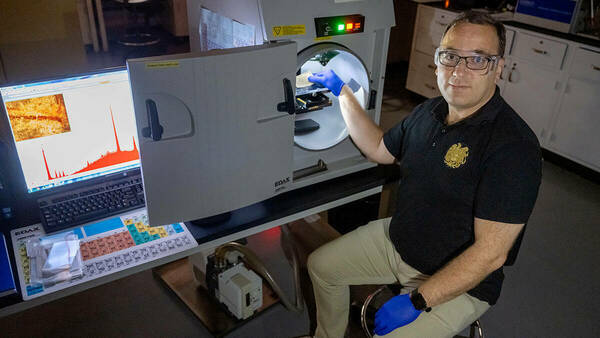
As more electronics companies and electric vehicle manufacturers incorporate lithium-ion batteries into their products, environmental concerns regarding the storage of used batteries and the mining of the core materials that go in them are growing, as are domestic anxieties over the fact that these essential materials are not widely available in the U.S.
To address these issues, Reclion Inc., a new company based in South Bend, Ind., is commercializing a potentially transformative lithium-ion battery regeneration method developed at the University of Notre Dame. This patent-pending system, invented by Khachatur Manukyan, a research associate professor at Notre Dame’s Nuclear Science Laboratory in the Department of Physics and Astronomy, uses a chemical reaction that produces its own heat to regenerate the core materials in spent lithium-ion batteries. Manukyan said this method restores used batteries' cathode-active materials–including cobalt, lithium and nickel–to nearly their original capacity, thus making a recycled battery almost as effective as a new one.
“We believe our new method is more efficient, environmentally friendly and cost-effective than current lithium-ion battery recycling techniques,” said Manukyan. “It also saves time, is safer, reduces process complexity compared to the current standard, uses fewer materials and consumes up to 90% less energy than methods used today. In essence, our system is a significant leap forward in lithium-ion battery recycling efficiency.”
Lithium-ion batteries, known for storing a large amount of energy in a small, lightweight package, have become among the most common types of batteries used today, with their future use expected to grow further still due to their ubiquity in electric vehicles, mobile phones and laptops.
This significant increase in usage has raised concerns about the environmental impact of managing old, used batteries, as they contain toxic materials that can leach into soil and water and pose fire risks in landfills and recycling facilities. There are also ecological concerns associated with mining the materials needed for these batteries, including extensive water usage, contamination of water supplies, greenhouse gas emissions and habitat destruction. Additionally, most of these materials are not widely available in the U.S., thus making the country dependent on foreign suppliers.
Due to these issues, governments, battery manufacturers and electronics companies have been exploring ways to recycle used lithium-ion batteries over the past decade. However, due to the industry's infancy and undeveloped recycling methods, the majority of used batteries today are not recycled. As a result, new ones must be manufactured to meet growing demand. This, in turn, only exacerbates the environmental and supply-chain concerns associated with lithium-ion batteries.
Manukyan is confident his new process being commercialized by Reclion, where he serves as a scientific consultant, will lead to many lithium-ion batteries being recycled rather than discarded. “Since our method is significantly better than current standards, we are confident that once it is fully validated in the marketplace, it will stimulate demand for lithium-ion battery recycling amongst electric vehicle manufacturers and other heavy users of lithium-ion batteries. This will reduce environmentally damaging mining, protect our soil, water and air and decrease reliance on imported materials. Achieving this would be a significant accomplishment for Reclion, Notre Dame and, most importantly, the environment.”
One of the first challenges the startup will address in its quest to validate this technology is scaling Manukyan’s process. The method currently works only in small quantities, measured in grams. For commercial success, however, Manukyan says the company will need to scale the process from grams to kilograms for industrial use. Manukyan acknowledges the challenge but believes it can be overcome.
“As with most inventions developed in labs, scaling up our recycling process will take time and further research,” said Manukyan. “However, we are confident that within one or two years, the method will reach the scale needed to attract a commercial battery recycling partner and thus lead to the first commercial-scale use of our method. After that, we hope rapid adoption will follow.”
About the IDEA Center
The IDEA Center is the University of Notre Dame's fundamental resource for Innovation, De-Risking and Enterprise Acceleration. It supports all commercialization and entrepreneurial activities at the University, from idea development to business formation, prototyping, and student entrepreneurial education. As part of Notre Dame Research, the IDEA Center provides the necessary space, services and expertise to bring the best Notre Dame faculty, student, staff, and South Bend-Elkhart community ideas and innovations to market. To learn more about the center, visit ideacenter.nd.edu. To learn more about Notre Dame Research, visit research.nd.edu.
Originally published by at ideacenter.nd.edu on July 31, 2024.